The Takeover of the National Assembly
Using police and military personnel, chavismo kept most of the journalists and opposition lawmakers out of the Legislative Palace, in order to appoint a loyal board led by a corrupt deputy. But Juan Guaidó was reelected as speaker in an official session.


Photo: Iván Ernesto Reyes
At 7:50 a.m. on Sunday morning, all the streets within a one-mile radius of the Legislative Palace in downtown Caracas were closed. That didn’t happen during the inaugural session of the National Assembly (AN) in 2019, in 2018, or in 2017. Press credentials, meant to be picked up at the administrative offices of the AN a couple of blocks away from the Palace, were suddenly moved to nearby Teatro Principal, usually headquarters for the media during chavismo’s events. Roughly 380 journalists were denied entry into the Palace. Three hours before the session, something was smelling fishy already.
Francisco Torrealba, who has served as spokesman for the PSUV deputies who just returned to the AN, tweeted on Saturday: “You don’t wanna miss it.” The question in everyone’s mind was if Juan Guaidó had the votes to be reelected as speaker and therefore retain the status of caretaker president recognized by more than 50 countries. But chavismo went ahead, setting up checkpoints for the deputies.
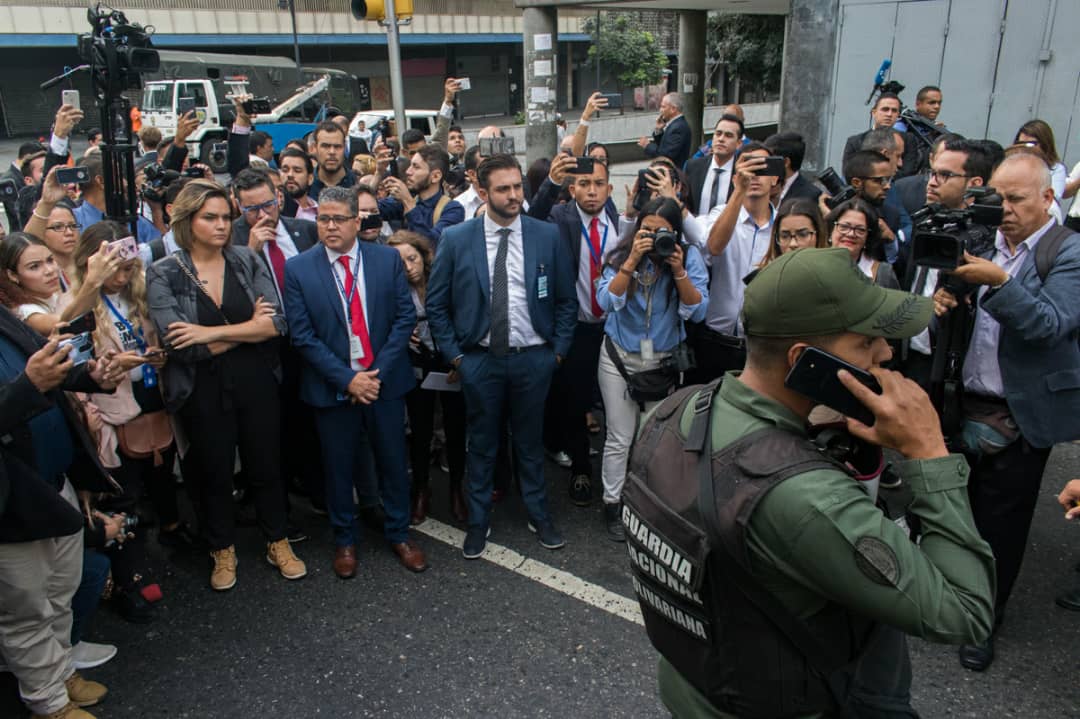
On Sunday morning, all the streets within a one-mile radius of the Legislative Palace in downtown Caracas were closed. Photo: Iván Ernesto Reyes, Caracas, 2020.
The one installed at the corner of El Chorro funneled everything, letting lawmakers go in groups of three or four, including two deputies close to Guaidó: Stalin González and Edgar Zambrano. The only member of the incumbent board missing was Guaidó himself. At 10:30 a.m., opposition party Acción Democrática’s chief, Henry Ramos Allup, confirmed that the speaker was “right behind, waiting for fellow deputies.” Three ladies waited for Ramos to stop talking to the press and asked him for some photos. He refused, but didn’t miss the opportunity to hug a young fan. “He still has it,” yelled one of the other three. They all laughed.
In the meantime, the press was divided. Journalists with credentials issued by the Ministry of Information were escorted out of the AN and into the Municipal Palace at Plaza Bolívar, with orders of “staying put.” The ones without access were trapped between corners El Chorro and Catedral, two blocks ahead and a block and a half from the National Assembly. Cell reception was almost non-existent.
A sea of young parliamentary assistants was also there, waiting for their bosses to make a Twitter or Instagram video, taking selfies or grabbing a coffee in Páramo (chavismo’s Starbucks). Deputy Biagio Pilieri showed up, after 11:00 a.m. He was the first heavyweight from the 16 de Julio group, led by María Corina Machado’s party Vente, the most radical wing of the opposition, a fierce critic of Guaidó and an open promoter of an armed international intervention as solution for the Venezuelan political crisis. With two folders in hand, Pilieri addressed the press-while, clipped onto one of the folders, a piece of paper clearly read “vote for J.G.” A mystery solved: Guaidó would have an overwhelming majority to be reelected.
The Fence
“Chupi, chupi, chupi!” was the background noise, coming from an ice cream vendor that passed while Juan Guaidó tried to cross the blockade at Catedral. Then, madness: As Guaidó was going through, a group of six guards blocked deputy Gilberto Sojo, yelling he was banned from office. He, and a dozen journalists, pushed forward. GNB Commander Acosta came from behind to put order to his troops.
A young, skinny officer was crying for help, having lost his helmet and shield. A couple of photographers helped him out. He went the other way around, got a new helmet and shield and came to formation, shoving the same people who assisted him before.
“What the fuck, man?” replied a photographer.
The boy answered with a sinister grin and pushed away.
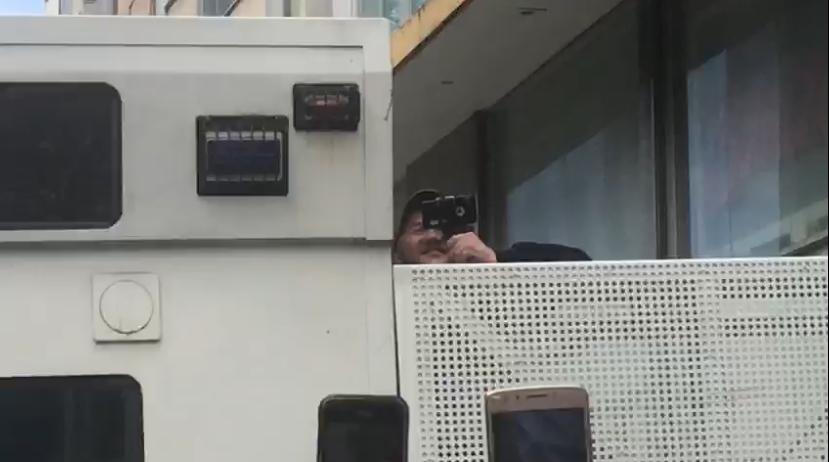
Pedro Carvajalino, had the higher ground filming the scrimmage from the top of a GNB armored vehicle. Photo: Arnaldo Espinoza, Caracas, 2020.
Chavismo’s favorite “journalist,” Pedro Carvajalino, had the higher ground filming the scrimmage from the top of a GNB armored vehicle. As one of the videographers recorded him, he replied in his signature fashion: “You’re all a bunch of cocksuckers.” UNT deputy Omar Barboza carefully stepped backwards, and never got into the fight.
At the Palace, the lieutenant colonel in charge of the blockade (where deputies had to go through a rigorous identification process) had been ordered to roll call the “attendees” to simulate quorum within the AN. Guaidó wasn’t on the list, nor were the two dozen deputies waiting for him outside. It was clear chavismo had made a list to guide the officers about who would have access to the building: most of those lawmakers who were going to vote for Guaidó were left out.
Guaidó waited confirmation on Sojo to go inside, while chavismo began applying the internal rules of debate at the Parliament “by analogy,” Francisco Torrealba dixit. After learning about this, Guaidó tried unsuccessfully to climb the fence. A few centimeters from Guaidó, the GNB dragged opposition deputies Delsa Solorzano and Nora Bracho away. There was no access anymore, just officers pushing back.
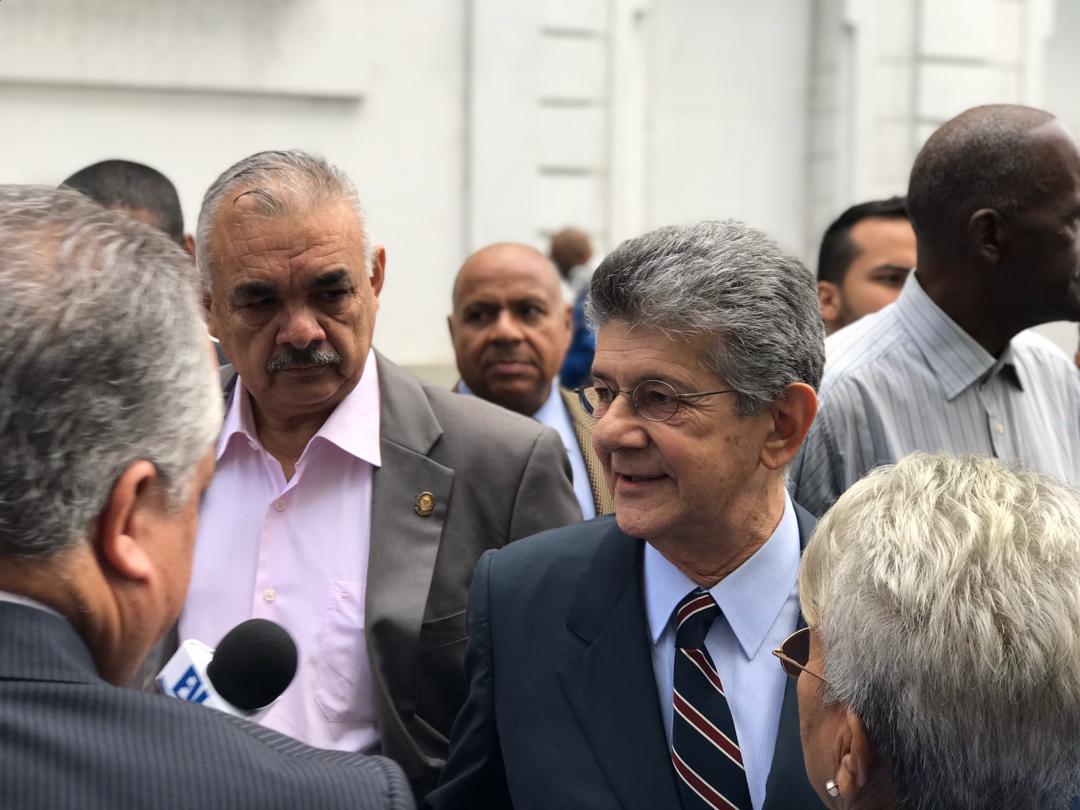
Henry Ramos Allup, confirmed that the speaker was “right behind, waiting for fellow deputies.” Photo: Arnaldo Espinoza, Caracas, 2020.
The “Parliamentary Coup”
“They swore Luis Parra in, the one from the Clap scandal!” was the cry at 1:24 p.m. on Catedral.
“How? He didn’t have the votes.”
“He’s just talking, a bullhorn in hand.”
“You see? The twins were right.”
“What twins?” several reporters asked, unaware of the famous seers who predicted these events.
Astrology was cut short. Chavismo had just managed to stage a vote where Luis Parra was elected as Speaker. This is a Primero Justicia deputy who was revealed as the leader of a secret lobby group for the Colombian businessmen behind the CLAP food program; a man expelled from his party after investigative journalist Roberto Deniz explained how he was working for the deeply corrupt scheme linked to Maduro.
Ambassadors were coming out of the Catedral blockade. France’s Romain Nadal was power-walking while the press asked him what happened. The Vatican Nuncio Aldo Giordano didn’t talk, and neither did Brazil’s representative. Minutes later, Elías Sayegh-mayor of El Hatillo- coined the phrase: “It was a parliamentary coup, a power grab.” Guaidó followed, his blue suit ripped on the left side, his tone louder than usual: “They just murdered the Republic.”
But then they announced their Plan B: To vote outside the Legislative Palace, at the headquarters of newspaper El Nacional.
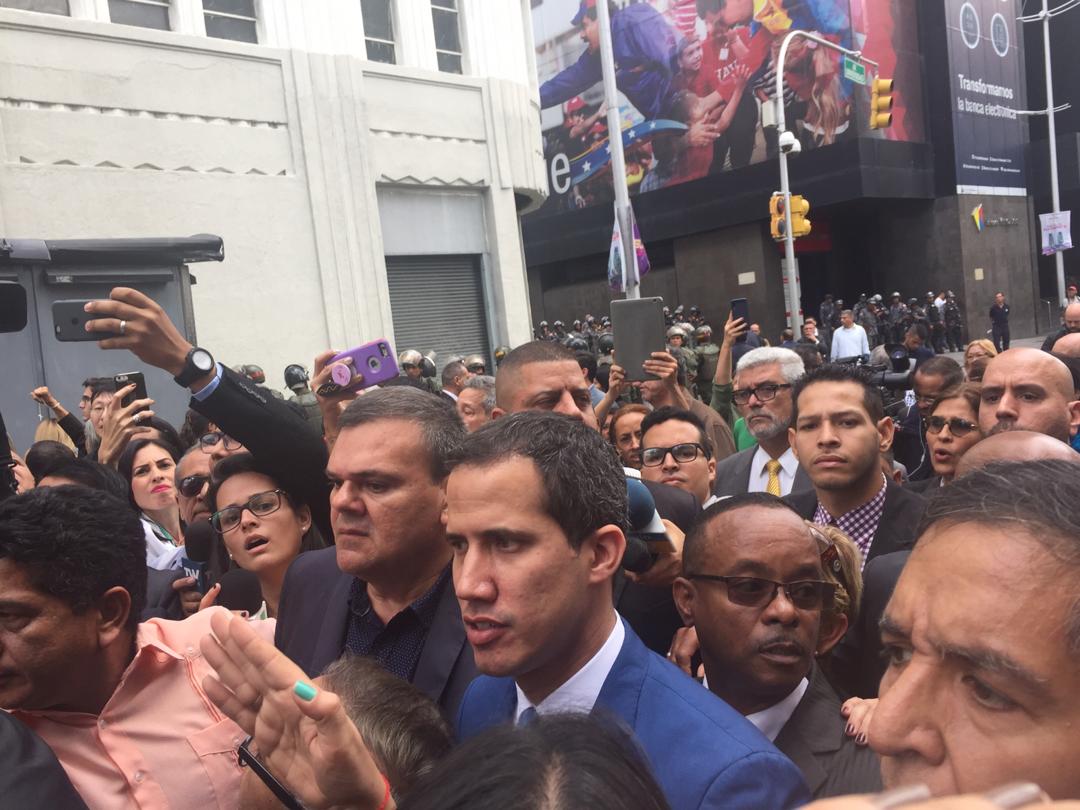
A few centimeters from Guaidó, the GNB dragged opposition deputies Delsa Solorzano and Nora Bracho away. There was no access anymore, just officers pushing back. Photo: María Corina Roldán, Caracas, 2020.
The Real Ceremony
The hall at El Nacional, a 76-year-old newspaper which stopped printing a year ago, was flooding with tiny pizzas, empanaditas and sandwiches for everyone. Also, plenty of water, papelón and Pepsi. This place was scheduled to host a celebration after Guaidó’s reelection.
More than 200 people invaded this lunch area while two big speakers were installed so everybody could hear. To speed-up the process, some deputies and assistants boarded an open truck to El Nacional and, inside the tiny auditorium, there weren’t enough chairs for lawmakers, ambassadors and people like Ricardo Cussano, president of the business chamber federation, Fedecámaras.
And so it began. One by one, exactly one hundred deputies voted for Guaidó to be ratified as the Speaker of the National Assembly. The number is tricky, though: the session incorporated at least five alternates of deputies that were at the Legislative Palace in the morning and voted in the illegal session. Still, the numbers were there.
With Guaido’s oath, technically he continues in his role as caretaker president. The situation of Venezuelan political institutions, however, is—unbelievably—more complex than ever: Venezuela now has one National Assembly with its duly elected board; a parallel National Assembly board supported by chavismo; an illegal constituent assembly that has been usurping functions of the National Assembly; a Supreme Tribunal packed with illegally appointed judges; a group of judges appointed by the National Assembly who formed a “Supreme Tribunal in exile;” one caretaker President; and one Nicolás Maduro. Nothing is ever easy in Venezuela.
“See you Tuesday at the Palace,” said Guaidó during his last speech. We shall see, as January—and 2020, a parliamentary election year—is just getting started.
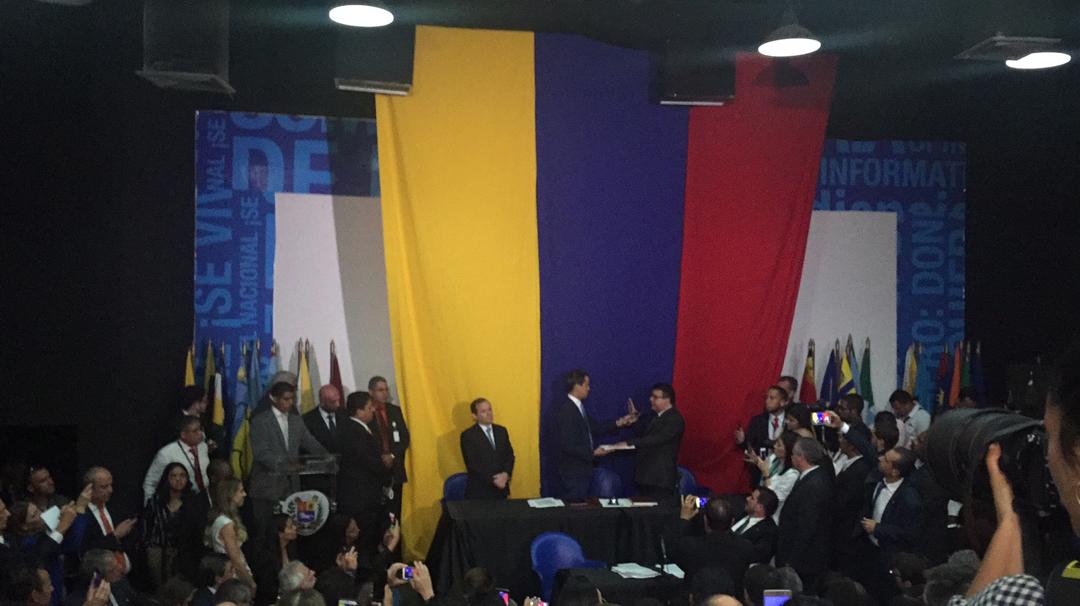
With Guaido’s oath, technically he continues in his role as caretaker president. Photo: María Corina Roldán, Caracas, 2020.
Caracas Chronicles is 100% reader-supported.
We’ve been able to hang on for 22 years in one of the craziest media landscapes in the world. We’ve seen different media outlets in Venezuela (and abroad) closing shop, something we’re looking to avoid at all costs. Your collaboration goes a long way in helping us weather the storm.
Donate




